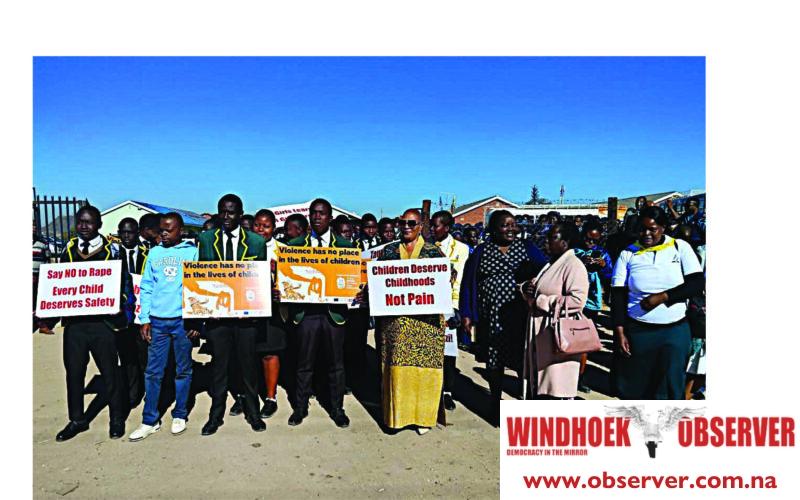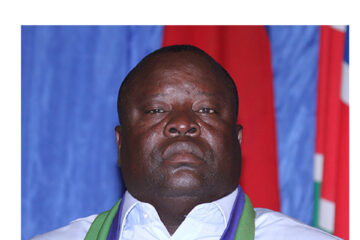Moses Magadza
The minister of state for provincial affairs and devolution for Masvingo Province in Zimbabwe, Ezra Chadzamira, has officially launched a national campaign against child abuse, rape, and the denial of sexual and reproductive health and rights.
The initiative forms part of the SRHR, HIV and AIDS Governance Project (2023–2026), funded by the Swedish Government and implemented through the SADC Parliamentary Forum and the Parliament of Zimbabwe.
It supports the domestication of key regional legal instruments, including the SADC Model Laws on Eradicating Child Marriage and Protecting Children Already in Marriage (2016), Gender-Based Violence (2021), and Public Financial Management (2022).
Addressing approximately five thousand people who included lawmakers, traditional leaders, educators, civil society organisations, and staff of Parliament at Mucheke Stadium on August 5, 2025, the minister declared the gathering as “a movement” rather than a mere event. He called for urgent and united action to combat the crises of abuse and sexual violence against children.
“We are not gathered today for entertainment or ceremony. We are gathered for something far more important: for truth, for justice, for healing, and for decisive action,” Chadzamira said.
“Let us be clear: abuse is not discipline. Rape is not a mistake. Ignorance about reproductive health is not a cultural value. These are injustices, and they must be treated as such,” he emphasised.
The campaign, spearheaded by the Parliament of Zimbabwe and the Zimbabwe Prisons and Correctional Services (ZPCS), aims to raise awareness, empower survivors, and foster community responsibility. It is rooted in constitutional guarantees, such as Section 76, which enshrines the right to basic health care services, including reproductive healthcare.
“This is not a favour or a privilege. It is a constitutional right,” the minister stressed.
He called for the empowerment of survivors, families, and young people.
He said, “To every survivor listening today, whether you are here in this stadium or hearing this message elsewhere, I want you to know you are not alone. You are not to blame, and your voice matters.”
He called, also, for a shift in social attitudes and urged communities to reject harmful practices and cultural taboos that shield perpetrators and silence victims.
“Silence will not keep them safe, but knowledge will,” he said, adding that protecting children is “not the job of Parliament alone” but a collective national duty.
The minister linked the campaign to broader national development goals, warning that Zimbabwe’s Vision 2030 to become an upper middle-income country could not be realised “if our young people are trapped in cycles of abuse, neglect, and despair.”
He further cited Sustainable Development Goal 3 on health and well-being, noting that it would remain elusive “if teenage pregnancies go unaddressed, if girls drop out of school because of rape, or if our clinics are under-resourced.”
A strong commitment was also made to strengthening institutions and referral systems to ensure that justice is not only available but also accessible.
“Laws exist, but they must be implemented. Policies are drafted, but they must be enforced. Perpetrators must face justice, not escape it through culture, corruption, or fear.”
He paid attention to the plight of young mothers, girls who, having survived abuse, now face the additional burden of motherhood. The campaign, Chadzamira said, will push for vocational training, safe housing, and school re-entry opportunities.
Commending the Parliament, ZPCS, SADC Parliamentary Forum, health and education ministries, and civil society for their collaboration, he paid tribute to the young people who courageously shared their stories.
“Your voices are the heartbeat of this movement,” he said.
He urged that the campaign must endure beyond the event.
“It must live on in every clinic we strengthen, every survivor we support, every harmful practice we reject, and every law we uphold.”
The day began with a vibrant solidarity march from Rujeko Secondary School to Masvingo Polytechnic College.
Speaking at the same event, deputy speaker of the Parliament of Zimbabwe, Tsitsi Gezi, reaffirmed Parliament’s commitment to tackling child abuse through legislative reform, oversight and citizen engagement.
“This campaign is not a one-off. It is a sustained national drive to protect the lives and futures of our children. Parliament will not relent until every child is safe, every perpetrator is brought to justice, and our laws reflect the values of a caring, protective nation,” she said.
The campaign seeks to address these challenges at the grassroots level, with targeted outreach to schools, homes, and communities.
The programme at Masvingo Polytechnic was rich in substance and emotion. Performances by the Prison Inmates Choir and student-led poetry, music, and drama drove home the campaign’s urgent message.
Survivors and inmates shared deeply personal testimonies, shining a light on the devastating impact of abuse and the hope that lies in healing and accountability.
Stakeholders from the ministry of primary and secondary education and the Zimbabwe Republic Police presented coordinated strategies being employed to address sexual abuse of minors. Exhibitions and information booths by local institutions and partners offered practical tools and services to bolster community resilience.
Following successful phases in Mashonaland Central and now Masvingo, the campaign will next move to rural communities, where vulnerabilities are often most acute.
In a vote of thanks, the chairperson of the parliamentary portfolio of health and child welfare, Thokozani Khupe, urged Zimbabweans from all social classes to transform awareness into tangible, sustained action against child abuse and the denial of sexual and reproductive health rights.
“What we have witnessed today has been far more than a public awareness event. Indeed, it has been a moment of collective awakening… the beginning of a revolutionary initiative,” she said.
Khupe stressed that “behind every statistic are real lives – children and young people whose futures hang in the balance.”
She said the campaign must not end with applause and photographs but must ignite a movement across homes, schools, clinics, courts, and Parliament.
“This campaign must inspire a culture of zero tolerance towards child abuse and sexual violence, while encouraging open and informed dialogue on sexual and reproductive health,” she stated.
She added, “The fight… cannot be the responsibility of the government alone. It is the sacred duty of every citizen.”
Khupe called on lawmakers to “advocate boldly for stronger policies, better enforcement mechanisms and increased funding for child protection and SRHR services.”
She also lauded frontline service providers and educators, saying their “compassion and urgency” are essential to transforming lives.
She sent out a special message to young people.
“Our young people… represent the greatest assets we possess in this fight. We commit to continue supporting you as you step forward to claim your rights and actively shape your destiny.”
*Moses Magadza is the media and communications manager at the SADC Parliamentary Forum. Tapiwa Chiremba, Cleopas Gwakwara, Brenda Rumutsa and Nyasha Turuza who form the SRHR Team at the Parliament of Zimbabwe, contributed to this article.
Caption
Photo 1 – The minister of state for provincial affairs and devolution for Masvingo Province in Zimbabwe, Ezra Chadzamira speaks in Masvingo on Tuesday.
Photo 2 – ENOUGH! Zimbabwean members of parliament and citizens at the official launch of a national campaign against child abuse, rape, and the denial of sexual and reproductive health and rights.
Photo 3 – TAKING A STAND. School children watch in the background as Zimbabwean lawmakers and SADC PF MPs stake a stand against child abuse, rape, and the denial of sexual and reproductive health and rights in Masvingo on Tuesday.
Photo 4 – INVOLVED. Zimbabwean lawmaker and the Chairperson of the Parliamentary Portfolio of Health and Child Welfare, Thokozani Khupe (with placard) marches with drum majorettes against child abuse, rape, and the denial of sexual and reproductive health and rights in Masvingo on Tuesday.
- Photos: Parliament of Zimbabwe.




